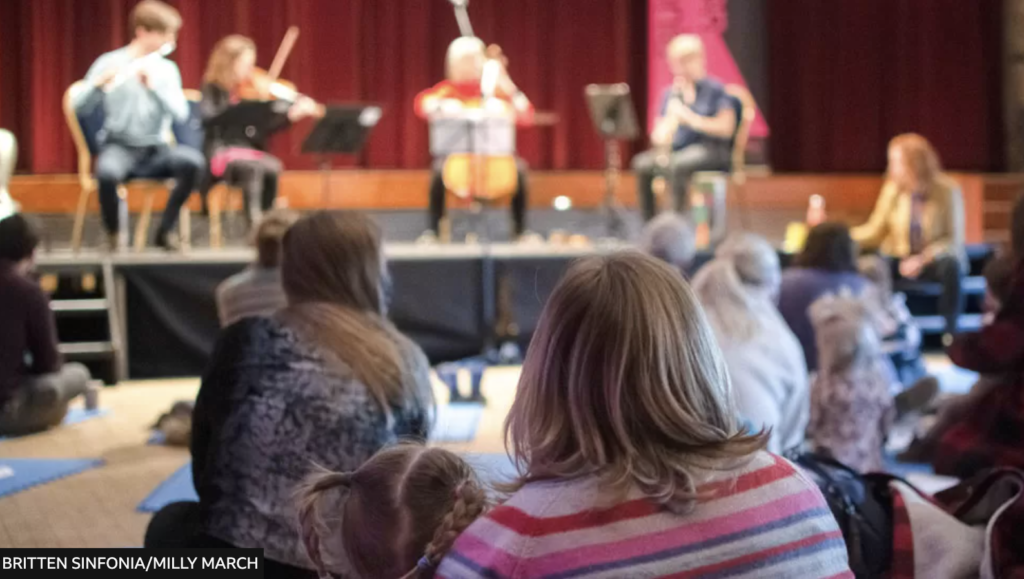Cambridge Britten Sinfonia launches £1m appeal after funds cut
The “UK’s finest chamber orchestra” has started a £1m appeal after Arts Council England removed its funding.
The Britten Sinfonia is based in Cambridge, has residencies in Norwich and Saffron Walden in Essex, and also works across Suffolk and Lincolnshire.
Founding member, Nicholas Daniel, said it had been “utterly baffled” as to why its funding was cut but “took it as a challenge” to raise the shortfall.
Arts Council England said it had had to make “difficult decisions”.
The grant-giving body, which invests money from the government in arts and culture organisations in England, announced the cutback in November, in a major shake-up of arts funding which aimed to move money more equally around the country.
The sinfonia, which was founded in 1992 and is the only professional orchestra in the East of England, said this left them with a shortfall of £1m over three years.
It said it had a “wide-reaching presence throughout the East of England” in both concert halls and health and community settings, plus more than 80 schools across the region, many of them in “levelling up” areas. It also tours to the USA, South America, India and across Europe.

Mr Daniel, the principal oboe player, said the cut had been “devastating” after 30 years of building the sinfonia into a world-class orchestra and this was “not the way to level up”.
“The trouble is it is so easy to lose something in this current climate we’re in with the arts; it’s so easy to just throw it away and we have to fight,” he said.
“We agree that more people should have access to quality live music in the community, in concert halls and in schools, but this is not the way to do it – to cut the only [professional] orchestra [in the area] out of the national portfolio.”
“We are utterly baffled; there is no criticism of us at any time during our national portfolio status or any criticism we can see in the reviews we’ve had since we were told we were being cut.”
He said that taking a small amount of funding from every organisation would have been better
“We could have dealt with a hair cut but not with a massive overnight 100% cut in the grant,” he said.
“[But] we’ve taken it as a challenge and we have risen to the challenge.
“The arts is such a crucial aspect of our national wellbeing, our mental health, our quality of life and, without it, the country would look so unbelievably different so it’s definitely worth investing in.”
Meurig Bowen, its artistic director and chief executive, said: “This level of skill, expertise and extraordinary musical synergy is rare; it has taken three decades to build, and simply can’t be replicated overnight.”
He added that the loss of Arts Council England funding “will not decrease or degrade what we do”.
An Arts Council England spokeswoman said it had to “make many difficult decisions in delivering a balanced portfolio that ensures more people and more places get to experience fantastic cultural experiences”.
“We recognise the impact of Britten Sinfonia’s work and have awarded them £237,188 of transition programme funding to support them managing this change,” she said.
The Royal Household’s Master of the King’s Music, Judith Weir, backed the appeal, saying “more live classical music outside of our biggest urban centres” was needed.
The composer said the sinfonia is “widely considered to be the UK’s finest chamber orchestra”.
Singers Dame Sarah Connolly and Roderick Williams, trumpeter Alison Balsom and pianist Benjamin Grosvenor are among those backing the fundraising bid.
The orchestra was named after Suffolk-born composer Benjamin Britten, who founded the Aldeburgh Festival. The Britten Sinfonia’s current programme includes shows in London, Spain and the East of England, including a performance at Snape Maltings as part of the Aldeburgh Festival.
View this story in full on bbc.co.uk
